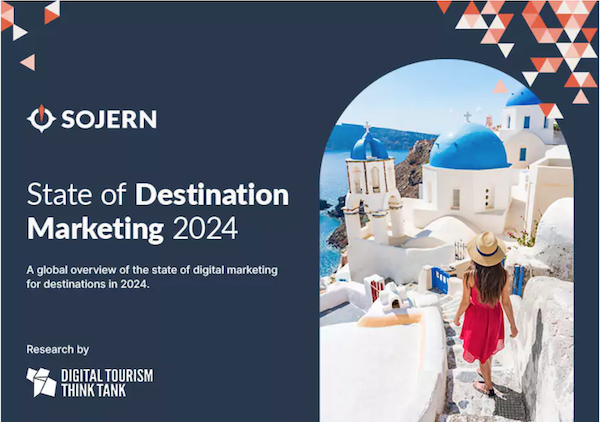Based on insights from nearly 300 destination marketing organisations (DMOs,) government departments and affiliated tourism entities worldwide, the State of Destination Marketing 2024 report explores effective marketing strategies for engaging travellers and offers a glimpse into the future of destination marketing. Sojern commissioned this report to ensure its global destination clients have access to the most comprehensive marketing insights.
This first-of-its-kind report, produced through a partnership between Sojern and Digital Tourism Think Tank (DTTT), and supported by Brand USA, Destination Canada and the European Travel Commission, sheds light on the latest industry trends and challenges.
The report found that economic uncertainty, inflation, and the cost of living are all having a significant impact on strategies, with more than 50% of respondents considering these to be areas that require careful planning.
Adopting Artificial Intelligence (AI) And Disrupting DMOs
AI is revolutionising marketing and will have a monumental influence on how destinations market to travellers. According to the findings, DMOs anticipate that AI’s impact will be most pronounced in content creation, with nearly half (49%) foreseeing significant impact. A growing number of AI tools are transforming creative processes, from long-form content to social media posts.
In addition, 40% of DMOs see significant potential in AI for predictive analysis and forecasting, 38% for data analysis and interpretation, and 37% for marketing content personalisation. However, 71% are currently less confident and see little potential impact in AI’s ability to shape their teams’ web, app and platform creation, and 63% in conversational marketing. DMOs perceive the least impact when it comes to AI on campaign creation and optimization (29%), creative media (25%) and web, app, platform creation (25%).
Prioritising Digital Paid Media Investments As Meta Dominates
Ninety-six percent of DMOs are making significant investments in paid media as an essential component in achieving their marketing objectives. Notably, 58% take an always-on approach, investing year round, while 38% invest seasonally and only 21% invest when specific opportunities arise. Social media advertising maintains its prominence, as does Search Engine Marketing (SEM), with 96% and 95% of DMOs rating them as having a high or average importance, respectively.
The most important channel formats comprise 94% native advertising or sponsored content, 85% display and video advertising, and 78% in-stream video ads. Additionally, Connected TV (CTV) shows promise, with more than half of respondents considering it of mid to high importance.
Instagram and Facebook remain the most important platforms when it comes to prioritising media and content investment, with 45% and 35% respectively of all respondents ranking Meta’s channels as their top channel of importance. While TikTok has become a global sensation, media investment hasn’t yet grown to the level some might expect, with only 5% ranking it as their most important channel.
Shifting Strategies Around Data And Privacy
Fifty-four percent of all respondents stated that data provides the most value in marketing planning. Demographic data (88%) is used most frequently to guide decisions, followed by behavioural data (79%). However, increased reliance on data also brings its challenges. Given the three most pressing obstacles to success are the lack of data integration across channels (52%), the high cost of acquiring data (46%) and limited access to quality data (42%), it becomes clear why demographic data currently serves as the primary proxy for decision making in digital marketing.
With Google’s deprecation of third-party cookies scheduled for mid-2024, 37% reported a significant impact, while 15% of respondents said that these changes have a small impact on their current strategies. DMOs are taking actions to mitigate the effects of these data privacy changes, with 60% planning to focus on social content and 58% prioritising obtaining more first-party data. The report found that the inability to track the right data is a significant issue, with the importance of obtaining first-party data now higher than ever. DMOs can capitalise on the current focus on demographic data and data-related challenges by partnering with a trusted travel marketing expert who offers high quality data that can be seamlessly integrated and activated across channels and devices.
Prioritising Environmental And Social Goals
DMOs are adapting their strategies in response to trends such as sustainability, diversity, equity and inclusion. European DMOs are leading in prioritising environmental sustainability (62% for climate change, 56% for biodiversity) compared to Canadian (29% for climate change, 24% for biodiversity) and US DMOs (8% for climate change, 33% for biodiversity).
Many DMOs are emphasising both social diversity and sustainability in their strategies, with figures showing that 42% of all those surveyed prioritise gender equality, and 45% of European and 40% of US DMOs strongly prioritise accessibility for visitors with disabilities. Around 35% of all respondents said that LGBTQ+-specific strategies (i.e. sexual orientation) were strongly prioritised, with similar importance (34%) placed on promoting social and economic diversity.
Embracing Co-Op Marketing Priorities
Seventy-eighty percent of global DMOs are actively investing in industry partner campaigns, or co-op marketing, a collaborative approach where DMOs partner with local business stakeholders to promote travel destinations.
Motivators for co-op campaigns include boosting overall marketing investment (58%), expanding audience reach (54%) and cost-sharing (46%). Notably, 70% of DMOs are embracing ‘full funnel’ marketing campaign activities. As the travel industry keeps changing, DMOs need to remain adaptable, focus on data and cultivate robust capabilities with their destination marketing strategies. To see the full survey methodology, download the report here.
SOJERN
https://www.sojern.com










